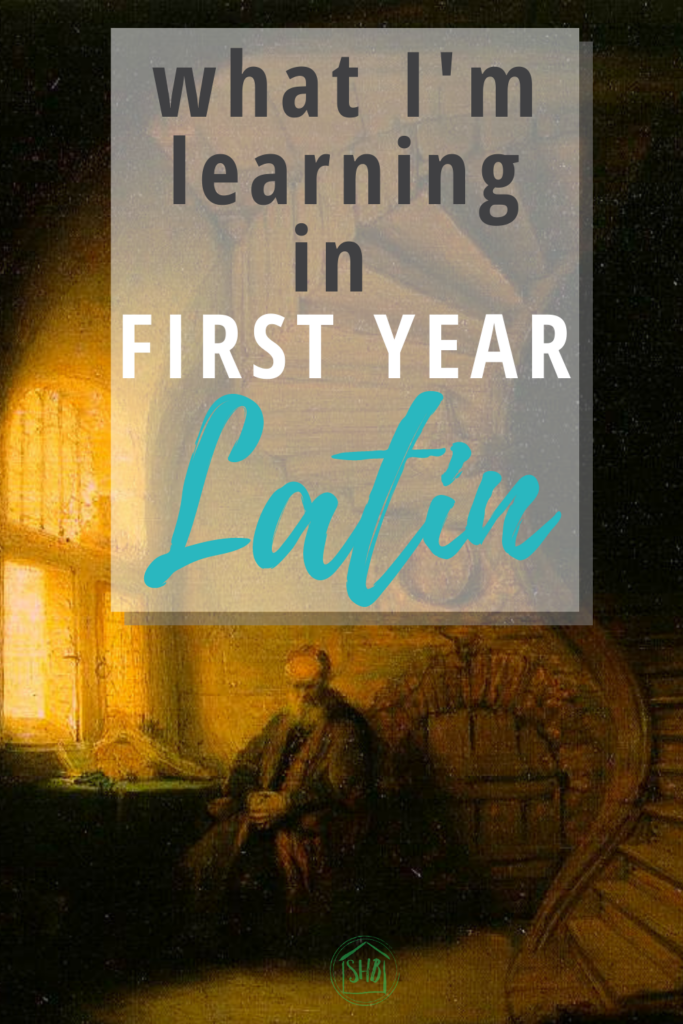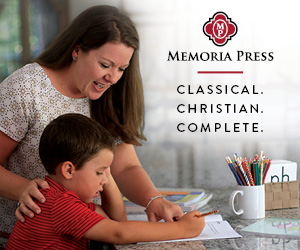
3 A.M. I woke up almost mid-thought. I had apparently been thinking in my sleep again. The night before I had read a small portion of our homeschool manual for grammar before going to bed. Verbs was the topic. At the end there was a passing reference to the Latin word for “Word” (the same “Word” referenced in John 1). I made a small observation regarding the action of God and called it a night.
At the above referenced time the next morning, I awoke with a rush of thoughts that could not be put back to bed. I got up and started searching the Scriptures to see if this was so. It was all too…BEAUTIFUL!
And it is so good, I just have to share with the class!
This post may include affiliate links. If you click and make a purchase based on my recommendation, I get a small remuneration at no extra expense to you. I only recommend things I use and believe to be a blessing.
The Latin Background
I mentioned here before that I have made it my goal to become fluent in Latin in my forties. Yes, that means I am a nerd. And if you feel you cannot take it, do not read on. This is about to get to get super-nerdy.
So, I am a “first year Latin student,” of sorts. I have cobbled together a curriculum and I am working somewhat diligently through it. However, I am not starting from zero here.
My kids and I have taken part in Classical Conversations community for the past 4 years. The Latin memory work has washed over me in much the same way it does a 5 year-old, and then a 6 year-old, and so on. The first two cycles of the CC memory work for Latin have almost no connection to reality for any of us. Simple songs, sung ad nauseum for four years.
The last cycle of CC memory work for Latin is where the flesh and bones of Latin reside. For cycle 3, the students (and parents) memorize Latin vocabulary used in John 1:1-7. And then they memorize John 1:1-7 in both Latin and English. It ends up being a sort of translation work project with the key already in the lock. All the student needs to do is turn the key.
I tell you all that to tell you this: the memory work we have diligently studied these past four years is absolutely the best preparation for learning Latin I can imagine. The number of times I have “known” something already in my Latin studies thus far, just because of the memory work is high. Noun endings, verb endings, rules for Latin grammar, vocabulary – all of it is already taking up space in my brain.
Without that knowledge, seemingly disjointed and without any sort of context, I would not be able to make the connections I am making now.
But have no fear, reader. Your understanding of the following epiphany is not predicated on any knowledge of Latin. I am simply going to walk you through the details. And, oh, it is SO GOOD!
Grammar is Universal
The grammar, no longer taught in public schools, is universal. That means the parts of speech are the same for every language. If one wants to speak intelligibly in any language, he must use a verb and a noun in each sentence. Even when we are trying to communicate with another person in a language we don’t speak, we think in verbs and subjects (nouns). We can leave out all the other parts of speech, if we don’t know them, and we can get our message across.
So, today this post is about Verbs. And I even have a definition for you.
A verb is a word that:
- Asserts an action
- Shows a state of being
- Links two words together
- Helps another verb.
This is the definition of a verb used in our Classical Conversations curriculum (Foundations and Essentials). Around our house, we sing it almost daily. No, I am not kidding. Since we sing it so much, it is locked down into the deepest recesses of my brain.
So, when I read in the Essentials curriculum, that we get the word “verb” from the word “Word” (used in John 1 to describe Jesus), it washed over me in a new way. As I said, I thought,
“Hmm. That is interesting because John is saying the Word (Verbum) was in the beginning with God, and He was God, and all things were made through Him, and without Him nothing was made that was made.”
See how that memory work can nestle in your thoughts?
Thus, it could be translated or said differently,
“In the beginning was the Actor (or Action) and the Actor (or Action) was with God and the Actor (or Action) was God.”
What was the Actor (or Action) doing in the beginning? What was His action? Creation!
Then I started thinking about other actions the Actor (or Action) performed. He, the Actor (or Action), set aside His glory and took on flesh. He walked among us, He performed signs and miracles, He spoke, He died, He rose again, He ascended!
Suddenly the action verbs in the book of John took on a whole new meaning! Now, when I read the book of John (or any of the gospels), I can watch the Actor doing all these Actions, knowing He does these things because it is tied into His very name, His very nature. He is the Verb, the Active Verb!
Pretty cool, right?!
A Word About Latin and the Bible
I don’t want you to get it twisted. The Bible was not written in Latin. It was originally written in Hebrew or Aramaic and Greek. So, when we are looking at Latin as translated in the Vulgate, we are not doing Biblical word study. We are doing Latin word study.
I am a huge Biblical Word Study nerd. In fact I wrote a book about it. It is one of the greatest passions of my life to teach others how to dig in for meaning in the Scriptures.
So that is what Latin study is NOT. But what is going on here, when we look at the Latin? Why study Latin at all? Why not just go back to the Greek or Hebrew and study that?
I contend you ought to study both (or all three).
But the distinction with Latin is this: Although it is not a Biblical language, it is the most important language in history. It must be studied because the greatest part of Classic literature, mathematics, and science are written in it. And I am sure God, the Author of everything, including all human language, knew exactly what He was doing when He decided the Latin word for Word needed to be Verbum.
I am even more convinced of this when I consider the intricacies of this definition of verb.
How to Find the Actor Verbum
There is so much more to my epiphany. In fact, as I started writing this article, I realized it would be too much for just one article. Thus, I am going to make this a series of articles, one for each function of a verb (listed in the definition above).
But I wanted to share with you what I am doing as I am reading through the gospel of John this month. I am simply underlining the action verbs. Then I am making a list (right in the margins of my Bible). I am watching to see how the Actor (Action) behaved, how He acted on sinful man’s behalf when He became flesh.
This list, made from the most simple observations, will serve as a primer – a primer for understanding who He is and what He did. It will also serve as a springboard for prayers of thanksgiving. Just think of how He acted on your behalf, how He has acted from the very beginning!!














